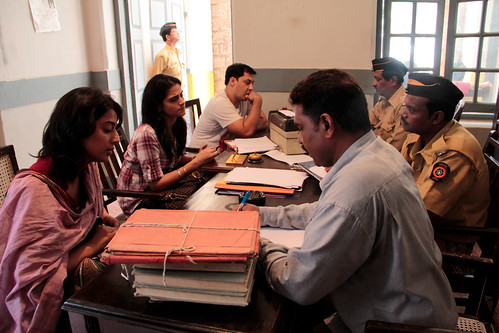Zeishan Qadri, who co-wrote Gangs of Wasseypur, makes an interesting directorial debut with small-time crime in another small-town setting. This time, it's Meerut.
Zeishan Qadri's Meeruthiya Gangsters wears its desi-ness on its sleeve, just as the debutante director does his feeling of kinship with mentor Anurag Kashyap, with whom he co-wrote Gangs of Wasseypur (and played a character called Definite). Like the GoW poster, which broke with the now-dominant practice of producing Hindi film posters in Roman font by having 'Wasseypur' appear in Devanagari, here 'Meeruthiya' is written in Devanagari.
Qadri also shares with Kashyap an abiding interest in the world of crime, and like him, much of his interest lies in bringing a very specific locale to the Hindi movie screen. If GoW produced a memorable fictional version of the coal mining and small-town mafia of Bihar and Jharkhand, Meeruthiya Gangsters is keen to capture the particular world of low-level crime on the fringes of Meerut.
In between, Qadri wrote the Kangana Ranaut starrer Revolver Rani (2014), also a gangster film. It tried hard to be 'different' by making its protagonist a sexually aggressive woman—that, too, in the Bhind-Morena badlands of Madhya Pradesh. But Qadri's vision of a man-hunting, brass-bodiced female gangster-politician didn't quite translate into believability, and Sai Kabir's uneven direction took us on a depressingly bumpy ride.
In contrast, with Meeruthiya Gangsters, which he has both written and directed, Qadri largely succeeds in laying out a credible world, complete with pitch-perfect dialogue. His film may have no moral centre, but he manages to achieve a texture quite different from that of Kashyap's in GoW: something quieter, less epic, less sprawling and infinitely droller.
The film's sociological setting is a halfway-house world that feels like the orphaned child of post-liberalisation India—neither rural in the old way, nor quite successfully urban. The plot centres on a group of young Meerut men, caught between the gaping holes of a meagre education and the imagined heights of an aspirational new lifestyle, who are intent upon getting ahead any which way. Qadri seems to know these characters inside-out, and as he takes us through their lives—from carjackings at gunpoint on the highway to doing pretend-presentations for corporate jobs—their seemingly jagged leaps begin to cohere into a depressing whole.
So it makes complete sense that that the gang's hideout is a shed somewhere in an expanse of fields—and it also makes sense that the well adjacent to the shed serves, at least once, as an improvised substitute for a plunge pool, in which they might squat on a hot day with bottles of beer. These are people who are usually to be found sipping chai in dhabas and eating golgappas on the street, and yet they seem to think nothing of spending lakhs of rupees at a time in some swanky new mall. This world has appeared before on screen, but with far less acuity, in Pravin Dabas's Sahi Dhande Galat Bande (2011), set in the similar rurban terrain of Outer Delhi.
Meeruthiya Gangsters stars no well-known faces, other than Sanjay Mishra and Brijendra Kala (both impeccable as always, if a little under-used). But it has a stellar ensemble cast. Jaideep Ahlawat as the self-appointed gang dada Nikhil, Jatin Sarna as the blond-dyed Sanjay Foreigner, Shadaab Kamal (who made a superb debut in Ajay Bahl's 2013 BA Pass) as the hotheaded, slightly crazed Sunny, talented Punjabi theatre actor Vansh Bhardwaj as Gagan, Nusrat Bharucha (Aakash Vani, Pyaar ka Punchnama) as Mansi all make a mark, and in a film crammed with minor characters, there is practically no-one who strikes a false note.
The film's tone is set by its male friendships, which in this world (as perhaps elsewhere) seem to combine bumptious irreverence with occasional bursts of unspoken sentimentality. Some of the men have girlfriends, who are referred to within the group as “settings”--and whenever the girlfriend in question is present, as “bhabhi”. These constant transitions, from nudge-nudge wink-wink to almost respectful familial, are so seamless as to start feeling almost unremarkable by the time you're halfway through. Yet they are revealing of how entirely masculine the film's world is.
We never really see any older women – mothers or aunts or even elder sisters. But the girlfriends are fascinating. Whether it's Nusrat Bharucha's Mansi, who works in a glitzy corporate outfit called Spice Route and has as few compunctions about plotting kidnappings as the men, or Sanjay Foreigner's “setting”, the salwar-kameez clad Mamta who thinks nothing of slapping her boyfriend in public, Qadri's attempt seems to be to show us a new breed of young women: glossy, sharp and as hard as nails.
They may turn out to be less nice than we – or the men – would like. But the film does seem to suggest they're the way they are because they must claw their way up, in a place so uniformly patriarchal that the fact isn't even worth mentioning – let alone protesting. Mansi, for instance, works in an office where male bosses think it perfectly normal to walk by singing suggestive songs, make remarks about her boyfriends, and finally openly solicit sexual favours. Mamta successfully elopes with Sanjay Foreigner, but is later prevented from marrying him by the standard North Indian police trick of declaring her na-balig, a minor.
Qadri deals with this (very real) milieu with dry humour. And he manages to make you smile. At one point in the film, a minor female character called Pooja, who is helping the gang bribe her bosses, notices one of the men peering down her shirt. She barely bats an eyelid. “Mujhe pata hai tu kya dekh raha hai. La Senza 36 B. Acchi hai na?” She ought to be a role model.
Published in Mumbai Mirror, Sep 20, 2015.


